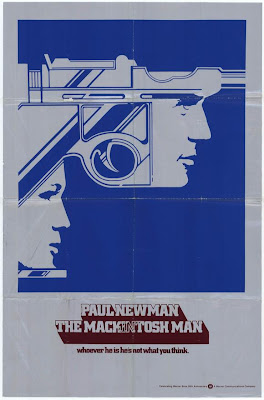
There’s really no damn reason that Key Largo should be my favorite John Huston movie.
I admire Huston’s films for their gritty realism; the way they really broke away from set bound filmmaking. Key Largo is completely stagy, totally set bound (Its based on a play by Max Anderson and brother does it show). I admire Huston’s films for their virility; the way they charge ahead madly to adventure and doom. Key Largo is mostly just people waiting around. I admire Huston’s films for their dynamism. Key Largo is a master class of restraint.
And yet for those who question Huston’s auteurism, I can offer no further proof of it. Despite carrying none of the calling cards I associate with Huston, Key Largo is unmistakably a Huston film, with its focus on masculinity and impotency. Its tight control of tone, its experiments in style, and its knowing precise takes on human nature.
Key Largo follows Humphrey Bogart as a GI just returned for the war, fulfilling the final request of his friend by delivering letters and personal effects to the GI’s now widow, and father, who owns a resort on the Key. A Hurricane warning strands Bogart at the hotel, along with the only other guests, a small time Chicago hood and his meager posse. Who can’t quite admit to himself that he’s straight up running for his life from the law and rival mobsters, and not just making some kind of power play.
It’s far too depressingly easy to imagine what the contemporary version of this would look like. With say Bruce Willis, sneaking from room to room offing thugs and making strained quips like “That was a force five!”
Instead Key Largo develops into a tightly coiled machine. Laying on the pressure ounce by ounce until it becomes nigh unbearable. It’s a movie with a perfect eye and ear for human nature, personified by a cast that represents the Hollywood contract system at its best.
Many talk about “hang out movies” movies that are enjoyable primarily because of the charisma of the actors and shading of the characters. Key Largo is perhaps the worlds first “anti Hang out film” a movie that succeeds primarily because of the profound tension created by the characters disparate styles and personalities.
There is of course Bogart at the center. Unassailably cool, unwilling to surrender either his dignity and his decency in the face of the corrupt men who want to take them. And Bacall every inch his match. Conventional wisdom says that offscreen couples never work onscreen, and old young couplings make both look foolish. But Bacall and Bogart’s four onscreen pairings refute that in the strongest possible terms. Not only do they always seem matched, in every sense of the word, but as for heat, they always seem about two seconds away from tearing off each others clothes and vigorously fucking.
Opposing them are Edward G. Robinson, in arguably his greatest performance as a man no less threatening for being utterly pathetic. And Claire Trevor. Pitiful as Robinson’s mistress, a terminal alcoholic who he makes sing for a drink in one of the most cringe inducing scenes I’ve ever seen in a film.
Huston was not a showy auteur. He did not draw attention to himself and what he did. Instead he merely crafted wise films about the varied nature of humanity that some how never quite crossed the line into cynical, no matter how tempting it must have been. He was the rarest of filmmakers. One who made the system work for them. Giving him the time and resources for daring experimentation, and the support for solid storytelling.
If a reluctance to be pigeon holed is all it takes for one to be denied auteur status I cannot help but wonder if such distinctions are as silly as outsiders suppose them to be.











































































































